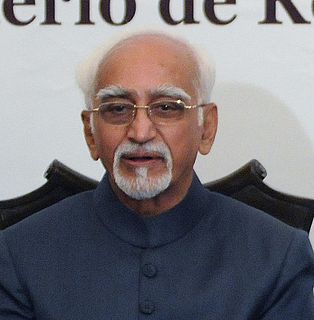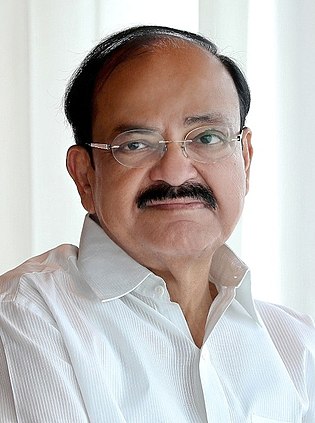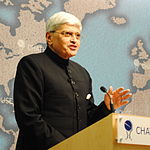The politics of India takes place within the framework of the country's constitution. India is a federal parliamentary democratic republic in which the President of India is the head of state and the Prime Minister of India is the head of government. India follows the dual polity system, i.e. a double government that consists of the central authority at the centre and states at the periphery. The constitution defines the organisational powers and limitations of both central and state governments, and it is well-recognised, rigid and considered supreme; i.e. the laws of the nation must conform to it.
The National Democratic Alliance (NDA) is a coalition of Progressive centre-right to right-wing political parties in India. At the time of its formation in 1998, it was led by the Bharatiya Janata Party (BJP) and had 13 constituent parties. Its chairman was late Prime Minister Atal Bihari Vajpayee. Also representing the alliance are L. K. Advani, former Deputy Prime Minister, who is the acting chairman of the Alliance, Narendra Modi, current Prime Minister and the Leader of the House in Lok Sabha; and Arun Jaitley, Leader of the House in Rajya Sabha and Finance minister. The coalition ruled from 1998 to 2004. The alliance returned to power in the 2014 General election with a combined vote share of 38.5%. Its leader, Narendra Modi, was sworn in as Prime Minister of India on 26 May 2014.

Janata Dal (United) is a centre-left Indian political party with political presence mainly in Bihar and Jharkhand. The Janata Dal (United) was formed with the merger of the Sharad Yadav faction of the Janata Dal, the Lokshakti Party and the Samta Party on 30 October 2003. Janata Dal (United)'s party mentor and patron is the veteran socialist leader George Fernandes. JD(U) is currently a part of BJP led National Democratic Alliance (NDA).
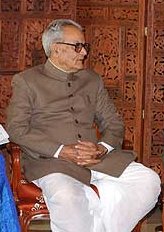
Bhairon Singh Shekhawat was the 11th Vice President of India. He served in that position from August 2002, when he was elected to a five-year term by the electoral college following the death of Krishan Kant, until he resigned on 21 July 2007, after losing the presidential election to Pratibha Patil. Shekhawat was a member of the Bharatiya Janata Party (BJP), a leading member of the National Democratic Alliance at the time of election. He served as the Chief Minister of Rajasthan three times, from 1977 to 1980, 1990 to 1992 and 1993 to 1998.

Gopalkrishna Devdas Gandhi is a retired IAS officer and diplomat, who was the 22nd Governor of West Bengal serving from 2004 to 2009. He is the grandson of Mahatma Gandhi. As a former IAS officer he served as Secretary to the President of India and as High Commissioner to South Africa and Sri Lanka, among other administrative and diplomatic posts. He was the United Progressive Alliance nominee for Vice President of India 2017 elections and lost with 244 votes against NDA candidate Venkaiah Naidu, who got 516 votes.
India is a federation with a parliamentary system governed under the Constitution of India, which defines the power distribution between the union, or central, government and the states.

Najma Akbar Ali Heptulla is an Indian politician and the current Governor of Manipur and the Chancellor of Jamia Millia Islamia. She is a former vice-president of the Bharatiya Janata Party (BJP), and a six time member of the Rajya Sabha, the Upper House of the Indian parliament, between 1980 and 2016, and Deputy Chairman of the Rajya Sabha for sixteen years. She was a member representing Rajasthan from July 2004 to July 2010. She was nominated by the BJP for the Rajya Sabha in 2012 from Madhya Pradesh, and assumed her office on 24 April 2012.
Rasheed Masood is an Indian politician, a member of the Indian National Congress party and a former member of the Lok Sabha representing Saharanpur constituency in Uttar Pradesh. He was a member of the Rajya Sabha. He was also the United National Progressive Alliance candidate for the Vice-President in the 10 August 2007 election and placed third with 75 votes.

The 14th indirect presidential election, in order to elect the 13th president, was held in India on 19 July 2012. The last date for filing nominations was 30 June, whereas the votes would be counted on 22 July. The two leading candidates for the presidency were former Finance Minister Pranab Mukherjee from West Bengal and former Speaker of the Lok Sabha Purno Agitok Sangma from Meghalaya.
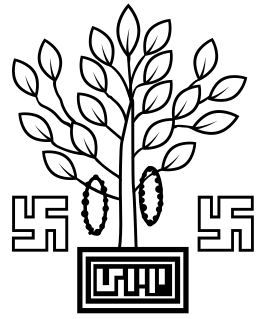
Elections in the state of Bihar, India are conducted in accordance with the Constitution of India. The Assembly of Bihar creates laws regarding the conduct of local body elections unilaterally while any changes by the state legislature to the conduct of state level elections need to be approved by the Parliament of India.
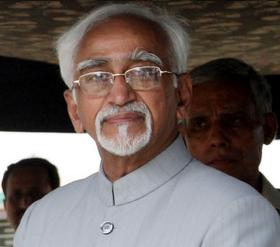
The 2012 Indian Vice-Presidential election was held on 7 August 2012 to elect Vice-President of India. Mohammad Hamid Ansari was the incumbent and the UPA candidate. The other prime candidate was the NDA's Jaswant Singh.

A presidential election was held in India on 17 July 2017 with the votes counted and the results announced on 20 July 2017. Ram Nath Kovind became 14th President of India. President Pranab Mukherjee, whose term of office was due to expire on 24 July 2017, declined to seek re-election due to health concerns and old age.
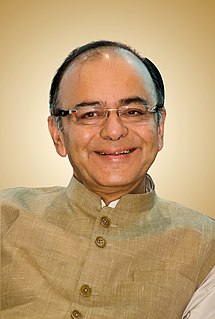
Rajya Sabha elections held in India on 21 July and 8 August 2017 to elect ten members of the Rajya Sabha, replacing those who retired in July and August 2017.
2017 in India highlights the national/Daily level events during the year.
